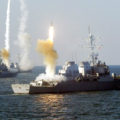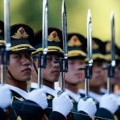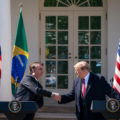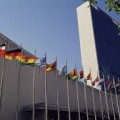Speaking at a Brookings Institution event earlier this month, Assistant Secretary of Defense for the Indo-Pacific region Randall Schriver sounded an alarm about China, and warned that the U.S. military needed to prepare for the significant challenge.
Schriver noted that “We feel we are in competition because fundamentally we have different visions, different aspirations and different views of what regional security architecture should look like.”
He stressed that while the U.S. seeks respect for national sovereignty, fair and free trade, and a rule-based order, the Beijing government “has a different vision and aspirations and is increasingly developing the tools to pursue its vision and seems willing to accept more friction in pursuit of that vision,” he said. “Globally, China seeks to shape a world consistent with its authoritarian model and national goals. We see that domestic governance in China as a result of CCP rule is increasingly authoritarian and less respectful of human rights and dignity.”
The Assistant Secretary outlined how the giant Communist nation has behaved in a worrisome manner, including launching influence operations to undermine free elections, using economic coercion on neighboring countries and encouraging outright theft of other nations’ intellectual property. “We see them extending their military presence overseas and expanding the ‘One-belt, One-road’ initiative to include military ties with China,” Schriver said. “And we see [Beijing] deploying advanced weapons to militarizing disputed features despite pledges at the senior-most level that they would not do so.”
While many nations develop their military to provide for their own national security, China, which has increased its military spending at a faster percentage than either the U.S.A. or the U.S.S.R. at the height of the Cold War, has specific, belligerent goals. “The [Defense] department views military developments in China as seeking to erode U.S. military advantages,” Schriver said. “They are working to become the preeminent power in the Indo-Pacific while simultaneously making plans to expand its presence and sustain its capabilities farther from Chinese shores.”
China is seeking to base troops and develop military capabilities in Africa, the Middle East and in the Western Pacific Ocean area. Its armed forces have trampled on the rights of other regional nations, and has been cited by the World Court for its invasion of the Philippines Exclusive Economic Zone. The Obama Administration failed to even lodge a diplomatic protest regarding that event, souring relations between Washington and Manila.
The extraordinary modernization leap of China’s world-class military was clearly on display at the recent Beijing parade marking the 70th anniversary of Communist rule. According to China’s Defense Ministry, “The parade reflected the military’s new structure, created through reforms starting in late 2015. The reforms were initiated by President Xi Jinping and represent the most thorough overhaul of the nation’s defense systems in the past several decades.”
One of the new weapon systems featured was the Dongfeng-41 nuclear missile, a solid-fuelled road-mobile intercontinental ballistic missile capable of reaching the US within 30 minutes. While the U.S. is tied to international nuclear arms treaties, China, not a signatory, is free to dramatically expand its offensive nuclear prowess.
Also displayed was the DF-17 hypersonic missile, perhaps the most advanced of its kind on the planet.
The focus was on more than hardware. Major Cai Zhijun, a senior official in the Central Military Commission and a key player in presenting the parade, noted that advanced operational tactics such as joint operations represented the increased sophistication of the nation’s armed forces.
Under the protection of first the British and then the American armed forces, international commerce and navigation increased dramatically as sea lanes were protected, and all nations were free to travel without fear. China’s philosophy is quite different. It’s rise to power would signal the end of global prosperity, as well as presenting a military threat even exceeding that which occurred during the Second World War.
Frank Vernuccio serves as editor-in-chief of the New York Analysis of Policy & Government

















Follow Us